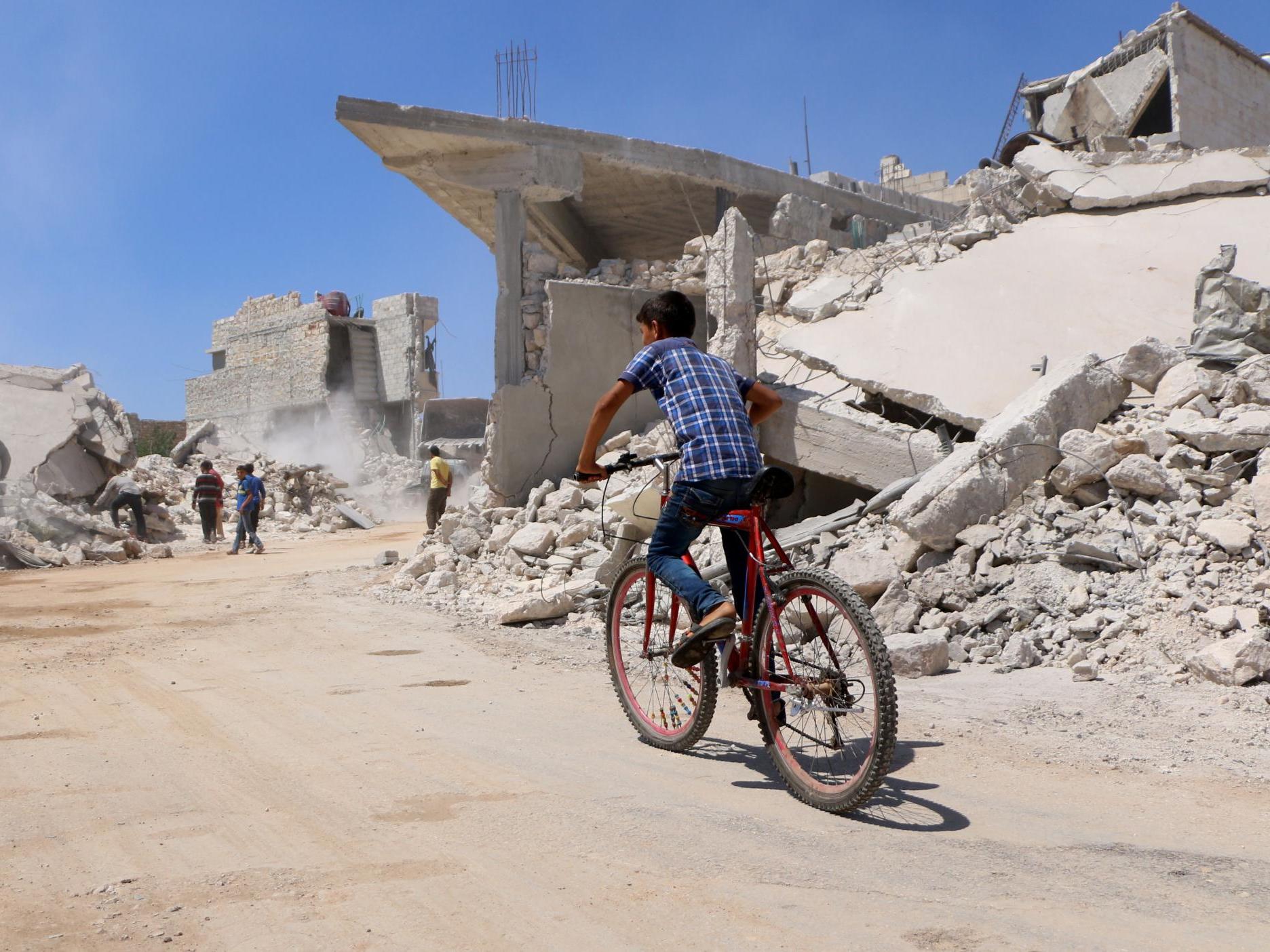Before we pay $250bn to ‘rebuild Syria’, we should force Putin to stop the endless death and destruction
The fate of 2.3 million people in Idlib, the last Syrian enclave held by anti-government forces, is in Russian hands. The area has already been subject to deliberate and indiscriminate bombing

Your support helps us to tell the story
From reproductive rights to climate change to Big Tech, The Independent is on the ground when the story is developing. Whether it's investigating the financials of Elon Musk's pro-Trump PAC or producing our latest documentary, 'The A Word', which shines a light on the American women fighting for reproductive rights, we know how important it is to parse out the facts from the messaging.
At such a critical moment in US history, we need reporters on the ground. Your donation allows us to keep sending journalists to speak to both sides of the story.
The Independent is trusted by Americans across the entire political spectrum. And unlike many other quality news outlets, we choose not to lock Americans out of our reporting and analysis with paywalls. We believe quality journalism should be available to everyone, paid for by those who can afford it.
Your support makes all the difference.Wielding a carrot and a stick, Russian president Vladimir Putin is seeking reconstruction aid for Syria.
The carrot is Putin’s claim that large financial contributions would make it easier for Syrian refugees to return home. The stick is the threat to allow attacks to proceed on the last major Syrian enclave held by anti-government forces, the northwestern province of Idlib, where 2.3 million people would be at risk. Both tacks are wrong.
Russian and Syrian forces’ indiscriminate bombing and shelling have devastated large swathes of Syrian cities. The estimated reconstruction cost is $250bn. Squeezed by a weak economy, Putin has limited capacity to help. Most recently in his meeting with German Chancellor Angela Merkel, Putin argued that if European leaders want Syrian refugees to return home, they should pay up.
But reconstruction aid is far from enough to allay refugees’ concerns about returning to Syria. To begin with, Syrian military and intelligence forces have already diverted large sums of humanitarian aid to line their pockets and fund their slaughter, so there is every reason to fear they would similarly divert reconstruction assistance. To make matters worse, the government has adopted Law 10 of 2018, which allows it to seize the refugees’ property.
Most importantly, many Syrian refugees, worried that the government views them as political opponents by virtue of their flight, fear for their lives if they return. Tens of thousands of Syrians have already disappeared into government detention centers, where torture and executions are rife. Recently the government has begun publishing death notices of former detainees, without any explanation of how they died or opportunity for their families to bury their loved ones.
Syria’s head of air force intelligence, Jamil Hassan, reportedly said last month that three million Syrians are still wanted and, if they return, will be charged with terrorism. In his view, as an anti-government outlet reported, “a Syria with 10 million trustworthy people obedient to the leadership is better than a Syria with 30 million vandals”. Until Putin convinces the Syrian government to dismantle this deadly machinery of repression – and to bring to justice those who operate it – an infusion of reconstruction aid will not persuade most refugees to return.
Given that unappetising carrot, Putin is also wielding a stick, implicitly threatening residents of Idlib. Until now, Idlib has served as an escape. As other anti-government enclaves fell, Syrian forces gave survivors the choice of being dumped in Idlib or risking detention. Roughly half of Idlib’s population is displaced from elsewhere in Syria.
But now Idlib itself is in jeopardy of indiscriminate and sometimes deliberate attacks on civilians and civilian infrastructure such as hospitals. These war crimes are a major reason why an estimated half a million people have been killed and more than half of Syria’s population displaced.
Russia clearly has the leverage to prevent a massacre in Idlib. Its air force has fought alongside Syrian aircraft since 2015 – a key reason why pro-government forces, whose battlefield position had been tenuous, now look likely to prevail.
In addition, Russia’s official arms exporter, Rosoboronexport, is Syria’s biggest weapons supplier. Russian diplomats vetoed efforts to refer Syria to the International Criminal Court and tried, ultimately unsuccessfully, to block the investigation into which forces are using chemical weapons.
Rather than pretend that paying the unreformed government would make Syria safe for refugees, European governments should press Moscow to use its influence to avoid a bloodbath in Idlib. Russia already has shown some interest. Idlib is the only one of four agreed “de-escalation” zones that Russia and Syria have not yet retaken. And both Russia and Turkey have set up “observation points” around the perimeter of Idlib. But it is callous and unseemly for Russia to insist on a massive payoff as the price for saving Syrian civilian lives.
There is another way. The Kremlin urgently wants better relations with the European Union to get sanctions lifted and improve prospects for its stagnating economy. There are numerous obstacles – Crimea, eastern Ukraine, flight MH17, nerve agent Novichok – but European governments should make clear that a civilian bloodbath in Idlib would put their relations in an even deeper freeze.
Long before any talk of providing reconstruction assistance for Syria, which in any event would require lifting separate targeted sanctions, European governments should call out Russia’s complicity in Syria’s war crimes and vigorously press the Kremlin to end these atrocities and stop underwriting Syria’s repression. The fate of 2.3 million Syrians in Idlib – not to mention any real prospect of refugees returning – depends on firmly conveying that message.
Kenneth Roth is executive director of Human Rights Watch
Join our commenting forum
Join thought-provoking conversations, follow other Independent readers and see their replies
Comments